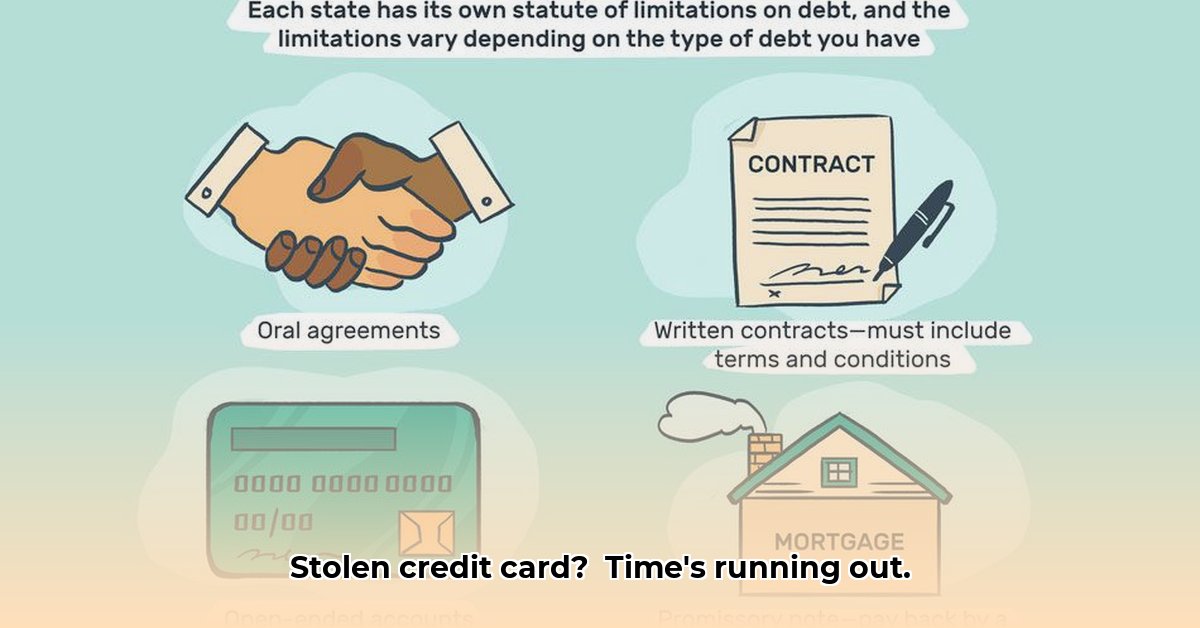
Ever had your credit card information stolen? Understanding statutes of limitations is crucial for recovering your losses and holding perpetrators accountable. This guide clarifies the complex legal landscape surrounding credit card theft, breaking down state and federal laws, explaining key legal terms, and offering practical advice.
Understanding Key Legal Concepts
Before diving into specifics, let's define some essential terms:
Statute of Limitations: A law setting a time limit for filing a lawsuit or pressing criminal charges. Think of it as an "expiration date" for legal action. Missing this deadline generally prevents legal recourse.
Discovery Rule: A vital exception where the statute of limitations clock starts only when the fraud is discovered. This is crucial for credit card theft, as fraudulent charges may go unnoticed for a period.
Criminal vs. Civil Actions: Criminal cases (prosecuted by the government) aim to punish the offender, while civil cases (initiated by the victim) focus on recovering financial losses. They often have different statutes of limitations.
Statutes of Limitations: A State-by-State (and Federal) Overview
There's no single national statute of limitations for credit card theft. Laws differ significantly between states and between federal and state prosecutions. The following table provides a general overview. Crucially: This is a simplified representation. Always consult your state's specific laws and legal codes for precise details. These laws are regularly updated, so up-to-date information is vital.
| State | Criminal Statute of Limitations (Years) | Civil Statute of Limitations (Years) | Notes |
|---|---|---|---|
| California | 3-5 (varies by specific crime) | 2-4 (varies by claim type) | Specific details depend heavily on the exact nature of the crime and claim. |
| New York | 5 (for most felony fraud cases) | 6 (for most fraud cases) | Laws related to specific charges apply. |
| Texas | 3-5 (varies by offense degree) | 2-4 (varies by claim type) | Multiple statutes may apply. |
| Florida | 4-5 (varies by fraud type) | 4-5 (varies by claim type) | Specifics depend on the exact circumstances. |
| Illinois | 3-5 (varies by crime) | 5 (for most fraud cases) | Complexities may require legal counsel. |
Criminal vs. Civil Actions: Key Differences
A criminal case, pursued by the government, focuses on punishing the perpetrator (e.g., jail time, fines). A civil case, initiated by the victim, aims to recover financial losses. Time limits often differ between these types of cases. For instance, a criminal case may have a longer statute of limitations than a corresponding civil case.
The Discovery Rule's Impact
The discovery rule significantly impacts the statute of limitations. The clock starts only when the fraud is discovered. If you don't notice fraudulent activity immediately, the statute of limitations begins from the date of discovery, not the date of the crime itself. Remember, proving the date of discovery can be critical. This is especially relevant in cases of digital credit card fraud, where fraudulent transactions may remain undetected for an extended period.
Practical Advice: Steps After Credit Card Theft
Acting quickly is crucial. If you suspect credit card fraud:
Immediate Notification: Contact your bank or credit card company immediately to report the fraud and potentially freeze your account to prevent further losses.
Law Enforcement Report: File a police report. This is essential documentation for future legal action. Retain a copy of the report and its reference number.
Gather Evidence: Collect all documentation proving the fraudulent activity: bank statements, purchase receipts, and communication records with your financial institution. The more evidence you have, the stronger your legal position.
Credit Monitoring: Regularly check your credit reports from Equifax, Experian, and TransUnion for suspicious activity. Consider placing a fraud alert or freezing your credit to prevent new accounts from being opened in your name. This proactive step can help prevent future issues.
Legal Counsel: Consult a lawyer specializing in credit card fraud and debt collection. They can guide you through the complexities of the legal process and your specific state's laws. This step is crucial for navigating the legal system effectively.
Risk Assessment and Mitigation Strategies
Preventing credit card theft is paramount. Here are key strategies:
Strong Passwords: Use strong, unique passwords for online accounts and consider a password manager.
Regular Monitoring: Carefully review your credit card statements for unauthorized transactions. Don't underestimate the power of regular review!
Secure Online Practices: Only shop on secure websites (indicated by "https"). Be wary of phishing attempts.
Document Shredding: Destroy documents containing personal information to prevent identity theft.
Public Wi-Fi Caution: Avoid accessing sensitive financial information on public Wi-Fi networks.
Conclusion: Understanding Your Rights
Statutes of limitations for credit card theft are complex and vary widely. The discovery rule complicates the timeline further. Don’t rely on generalized information. Seek legal counsel to understand your rights and specific deadlines based on your individual circumstances and location. Prompt action is crucial in protecting yourself financially and legally.